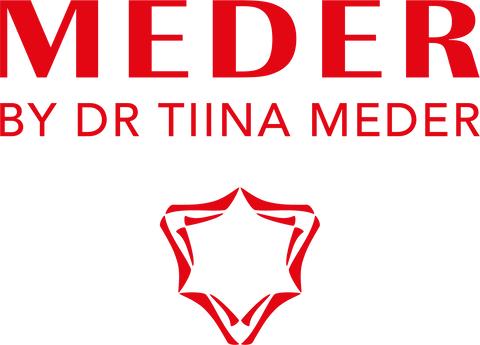
Collagen is the most abundant protein in your skin and serves as its natural scaffolding. It provides strength, firmness, and elasticity—helping our skin stay smooth, plump, and youthful. Deep in the skin, collagen forms a strong, flexible network that supports skin cells, including the key cells that make collagen: fibroblasts.
There are many types of collagen, but type I collagen makes up about 80% of the collagen in young, healthy skin, with type III and type V providing additional support. These collagen fibres are made of tightly packed molecules arranged in a triple-helix structure, which makes them very strong and long-lasting. This network forms the backbone of our skin’s deeper layer, the dermis.
Over time, collagen production naturally slows down, and the collagen network begins to break down. This leads to thinner, less elastic skin and is one of the main reasons for visible signs of aging like wrinkles, sagging, and dryness.
Fibroblasts live deep in the dermis and are the main cells responsible for producing collagen and elastin, the main proteins giving skin its strength and flexibility. They also make substances like hyaluronic acid, which attracts and holds water, keeping skin hydrated and bouncy.
Fibroblasts are very sensitive to their surroundings. They respond to both mechanical signals — such as tension from collagen fibers — and chemical signals like growth factors and cytokines. When activated, they increase collagen and elastin production and help maintain the skin’s structure.
However, as we age, fibroblast activity declines. When the collagen network is intact, fibroblasts feel the tension in the skin and work efficiently. But when collagen breaks down into small fragments, fibroblasts lose these attachment points, become less active, and produce less collagen. Worse, they increase enzymes called matrix metalloproteinases (MMPs) that further degrade collagen. This creates a harmful cycle of collagen loss and weakened skin.
Fibroblasts produce collagen initially as procollagen, which is processed outside the cell to mature collagen molecules that assemble into thick fibers. The turnover of type I collagen is extremely slow — taking decades to fully replace.
In young skin, enzymes that break down collagen like MMP-1 collagenase exist only in tiny amounts, balanced by natural inhibitors. As we age or when exposed to factors like UV light, these enzymes become more active, accelerating collagen breakdown while production slows.
Quality sleep is essential for maintaining healthy skin and supporting collagen synthesis.
During deep sleep stages, the body releases growth hormone, which plays a critical role in stimulating collagen production and skin cell regeneration. Adequate sleep helps repair daily skin damage, maintain skin firmness, and preserve elasticity. Conversely, chronic sleep deprivation has been shown to reduce collagen formation, accelerate skin aging, and impair the skin’s natural repair processes. Prioritizing restful sleep is therefore a simple yet powerful way to support your skin’s collagen and overall health.
Vitamin C (L-ascorbic acid) is a crucial nutrient for healthy collagen production. It acts as an essential cofactor for the enzymes prolyl hydroxylase and lysyl hydroxylase, which modify collagen molecules during their formation, stabilising the collagen triple helix structure. Without adequate vitamin C, these enzymes cannot function properly, leading to weaker, less stable collagen.
Beyond this enzymatic role, vitamin C also stimulates collagen gene expression and increases collagen-specific mRNA levels in skin fibroblasts, promoting greater collagen synthesis overall. Studies have shown that vitamin C and its stable derivatives can enhance collagen deposition and strengthen the skin’s extracellular matrix, contributing to improved skin elasticity and repair.
In summary, maintaining sufficient vitamin C levels — through diet, in the first place — is fundamental to supporting your skin’s collagen health and youthful appearance.
Sun exposure is a leading cause of premature collagen damage — or photoaging. UVA rays generate harmful molecules called reactive oxygen species (ROS) which increase MMP activity, breaking down collagen faster than it can be replaced. Besides UV, lifestyle factors like smoking, poor sleep, chronic stress, pollution, and high blood sugar also contribute to collagen damage through oxidative stress and glycation — processes that stiffen collagen and reduce skin elasticity.
Understanding how collagen and fibroblasts change over a lifetime helps explain why our skin looks and feels different at each stage — and what we can do to keep it healthy.
Fetal Development
Infancy & Childhood
Adolescence
Early Adulthood (ages 25–34)
Mid-20s to Early 30s
Perimenopause (~45–55)
Postmenopause and Elderly Age (>60)
Key External Influences Throughout Life
Further reading: Why We Need Retinol Alternative Skincare.
Collagen supplements have become very popular, but recent research urges caution. A 2025 meta-analysis published in The American Journal of Medicine reviewed 23 clinical trials and found statistically significant improvements in skin hydration, elasticity, and wrinkle reduction — but only when including low-quality or industry-funded studies. When focusing solely on high-quality, independent trials, these benefits disappeared. The researchers also noted publication bias and inconsistent results across studies. This suggests that taking collagen supplements does not guarantee increased collagen levels in your skin, as ingested collagen is broken down like any other protein in the digestive system. Therefore, while supplements may help some individuals, they are not a guaranteed or standalone solution for boosting skin collagen.
To keep skin firm and healthy, it’s essential to protect collagen and support fibroblast function. Here’s how:
Gentle mechanical stimulation — through massage, microcurrent therapy, or other energy-based treatments — can activate fibroblasts to increase collagen production naturally. Maintaining a healthy diet rich in key nutrients and antioxidants, good sleep, and sun protection all support skin’s collagen and overall health.
Collagen and fibroblasts are central to maintaining youthful, resilient skin. Collagen provides the structural framework, while fibroblasts produce collagen, elastin, and hydration molecules that keep skin firm and plump. Ageing and environmental factors gradually degrade collagen, weakening fibroblast function and skin quality. Protecting collagen through antioxidants, supporting fibroblast metabolism, reducing inflammation, and lifestyle care can help preserve healthy skin and slow the visible effects of ageing.





